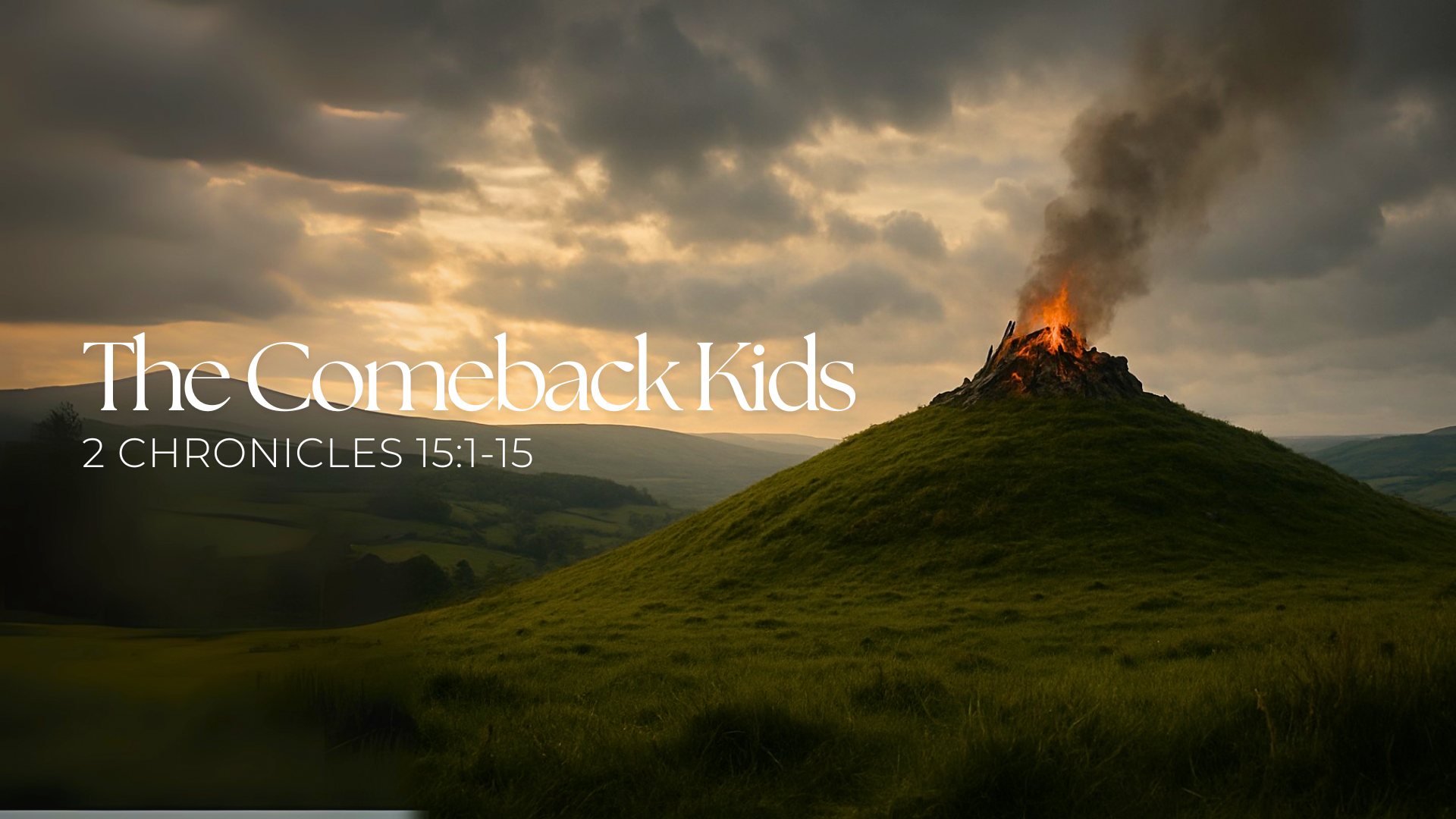
Home Is Where His Hesed Is (Ruth 1:3-15)
We all know difference between a house and a home. A house may have a proper bed and locking doors, but it’s never as easy to get to sleep in someone else’s house as it is in your own home.
I remember staying once with my grandparents and that first night I stayed awake with the lights on for hours. There were too many sounds, too many unknowns that made me worried. They were my grandparents, but it wasn’t my home, because home is a place of peace and provision and rest.
In our text, Elimelech’s family is rocked by three terrible tragedies. After all the burials are over, Naomi and her daughters-in-law have to decide where home is. Where will they find the rest that they need for the short term and their futures, which in the moment look so bleak?
We watch in dismay as Naomi tries to stop the ladies from moving back with her. Meanwhile, the Lord is quietly, graciously, faithfully beckoning them to come. Come find the rest that seems out of reach. You, Naomi, and, yes, even you Moabites, come and experience the hesed love of God.
Are you safe at home? I don’t mean a house somewhere in Hanford or Lemoore. I mean your life, your heart, your future. Can you join with Moses who prayed, “Lord, through all the generations, You have been our home. Our refuge.”[1] The place where we find true rest for our souls?
In this text we see God inviting His daughters home. Jesus has given the same invitation, not geographically, but spiritually. He said “Come to Me and I will give you rest for your souls.”
Let’s take a look at home and rest and how we can and should accept God’s invitation.
Ruth 1:3 – 3 Naomi’s husband, Elimelech, died, and she was left with her two sons.
The grass had looked so green in Moab – or at least, the grain had looked so golden – but the dream became a nightmare. Naomi’s husband, her provider, the leader of this family, died.
Was this judgment from God? The text doesn’t say. But the move to Moab was a disaster. To be buried in an unclean, foreign land was considered a terrible fate for an Israelite.[2] And our narrator uses a strong term when he says Naomi was “left.” It can refer to someone who survives an elimination process or to the residue that remains.[3]
Naomi and her sons are left bereaved, cut off from their extended family, left to fend for themselves. And we see how the book presents Naomi as the head of this household now. She’s in focus: It says, Naomi’s husband…her two sons. It’s unusual for ladies to be referenced that way in the Old Testament, but she’s it. The responsibility of this family is now on her shoulders.
Our life choices impact people. God designed humanity to be connected, not isolated. We’re not like the Middle East blind mole rat, which is known as the ultimate introvert. They dig a tunnel system underground and spend their whole lives there. If another mole rat accidentally tunnels into the home of another one, there’s often a deadly battle.[4] They want to be on their own.
Humans were made for community. Friendship. Family. Partnership. Society. All of these relationships bring not only advantages and opportunities, but also responsibilities. God’s word speaks to us about our responsibilities as people, as husbands, as wives, as parents, as children, as citizens, even as adversaries. Your life choices do not have consequences only for you. They impact the lives of the people around you – people who God holds you responsible to love and to serve and to support at one level or another. Self-centered choices lead to damaged lives around us.
Ruth 1:4a – 4 Her sons took Moabite women as their wives: one was named Orpah and the second was named Ruth…
Why didn’t Naomi go back to Bethlehem right away? Clearly, it wasn’t only Elimelech who stopped trusting God. Naomi continues with the ill-advised plan to integrate with Moabite society.
While it wasn’t specifically unlawful for them to marry Moabite women, it was definitely against the spirit of the Law.[5] But Naomi and her sons are still acting like the people of Judges. In fact, our narrator uses a strange term when he says they “took” these women as wives – a term loaded with negative connotations. It was last seen in Judges 21, where women were kidnapped to be wives.[6]
But here we’re introduced to the lady herself: Ruth. The exact meaning of her name isn’t certain. But scholars think it means something like, friendship or well-watered or fertile.[7] It could also mean “refreshment.”[8] And she is, indeed, one of the most refreshing characters in the Old Testament.
Ruth 1:4b-5 – After they lived in Moab about ten years, 5 both Mahlon and Chilion also died, and the woman was left without her two children and without her husband.
After a decade, even more tragedy hits the family. These two boys’ names mean things like, “To be sick,” or, “to be finished,” or, “frailty,” or “sterile.”[9] And they seemed to live up to those names, not only because they died young, but look: After 10 years neither of them had any children. That would’ve added significantly to the family’s social and economic worries.
For Naomi, this is a crushing blow. Obviously there would be her perpetual grief, but she has lost everything. Her husband is gone. Her sons are gone. Notice how verse 5 refers to her as “the woman.” It’s as if she’s even lost her identity.[10] She had no connections, no prospects, no skills, no hope in that land. Once again, she is left like the residue after a fire.
Ruth 1:6 – 6 She and her daughters-in-law set out to return from the territory of Moab, because she had heard in Moab that the LORD had paid attention to his people’s need by providing them food.
Suddenly a light shines into the darkness. In the shadow of death, a message of life. How did she hear about it? We don’t know the particulars, but this book is a story of providence. It is the story of a Lord, Who loves His people, and sends the good news of His loving grace so they can hear it.
His tender kindness is right there in verse 6. That phrase, “The Lord paid attention,” speaks of Him visiting them with care and concern.[11] The first time this term is used is back in Genesis 21, when the Lord visits Abraham’s wife, Sarah and does for her what He promised – gives her a son. Gives new life to their family. Life that eventuates in blessing for all the families of the earth.
Remember: Elimelech and Naomi left Bethlehem because of a famine. They didn’t think the Lord would take care of them. And now what do we see God doing? He’s doing the very thing they did not trust Him to do. They were wrong. He was faithful. He does watch out for His people.
For their part, the Moabite ladies decide to go with her. Notice that they set out, too. This is remarkable. They’re doing the opposite of what Elimelech did in verse 1. They’re giving up their community, their culture, their gods because they believe something about the God of Israel.
While Naomi’s testimony must have been muddled and compromised, clearly she taught these ladies something about the truth of God. Enough that they decided to trust their lives to Him.
Ruth 1:7 – 7 She left the place where she had been living, accompanied by her two daughters-in-law, and traveled along the road leading back to the land of Judah.
I’m struck by how simple the path back was for them. Not that there weren’t any difficulties or dangers, but they didn’t have to cut through a dense jungle to find their way. They didn’t have to blast through mountains or row over seas. There’s the road that leads you home.
The Bible uses this image of “taking a road” to speak about the course our life is on. The history books of the Old Testament use it to evaluate whether a king was good or evil. The prophets and the wisdom books use it to speak of moral or immoral paths.[12]
What path are you on? Jesus said there are two roads we can take. One is broad – easy to walk on – but it leads to destruction. The other is narrow, but it leads to life. And He went on to say that He is the way that leads to life. And the Bible is given as the lamp for our feet and the light for this path so that we can walk the road that leads home.
If you have drifted away from God or ran away from Him, if you find that you’re off the path that Christ calls you to walk, the fix is simple: The road is right there. Repent. Turn back to God. That’s what we see pictured by Naomi. Just return. Come back. You know where you’re supposed to be, so get moving.
The story, which has been so bleak so far, now depicts Naomi moving in the right direction. She’s heading home. And she even has this little, mixed multitude with her! But then, we have verse 8.
Ruth 1:8-9 – 8 Naomi said to them, “Each of you go back to your mother’s home. May the LORD show kindness to you as you have shown to the dead and to me. 9 May the LORD grant each of you rest in the house of a new husband.” She kissed them, and they wept loudly.
Oh no! Here are these two women, who love Naomi, who have some measure of faith in the God of Israel, and Naomi says, “Get out of here.” If you think that’s reading too much into it, we’re going to see this play out like one of those movie scenes where the kid has to tell the animal, “Go on, GET!” She’s tries hard to send them away.
We’ll find that even though she wants to benefit from the provision of the Lord in Bethlehem, she’s very angry at God. And she seems to be trying to excuse herself from her responsibilities and this precious opportunity to rescue two needy women from paganism.
In the next verses, she’s going to call them “my daughters” three times. And yet, what does she say here? “Go back to your mother’s home.” She knows in her heart that God has connected their lives together, but she says to them, “I’m not your mother. I want to be free of my responsibility to you.”
Now, she tries to dress it up with spiritual talk. “May the Lord show you hesed. May the Lord grant each of you rest.” But this was not a heartfelt prayer. This was a phrase used in a technical sense to end their relationship.[13]
Rest was a meaningful word to the Israelites. Rest was what God promised them on the other side of the Jordan.[14] A place of peace and happiness. Additionally, James Smith writes, “The term summarizes all the qualities of an ideal marriage in which a godly woman can find strength, security, material wellbeing and love.”[15]
There was no hesed in Moab. There was no rest apart from Yahweh. We’ll see in chapter 3 Naomi really felt it was her responsibility to find rest for her daughters-in-law, but right here? She’s angry. She’s bitter. She’s concerned about her feelings, not their future, and she’s still not trusting the Lord.
Ruth 1:10 – 10 They said to her, “We insist on returning with you to your people.”
Orpah and Ruth respond emphatically. They say, “No! on the contrary, we’re coming with you!”[16] Essentially they say, “Where must we go to be saved?” But Naomi isn’t walking with the Lord, so here’s her response:
Ruth 1:11-13 – 11 But Naomi replied, “Return home, my daughters. Why do you want to go with me? Am I able to have any more sons who could become your husbands? 12 Return home, my daughters. Go on, for I am too old to have another husband. Even if I thought there was still hope for me to have a husband tonight and to bear sons, 13 would you be willing to wait for them to grow up? Would you restrain yourselves from remarrying? No, my daughters, my life is much too bitter for you to share, because the LORD’s hand has turned against me.”
She tries a three-pronged attack to convince them to leave. Her response can be restated as, “You are wrong to go with me, you should not go, there is no point to it.”[17] Frankly, it’s shocking.
Blind mole rat mothers will tend their young for a while, but eventually become hostile to them and force them out from her tunnel. Naomi is lost, in the dark, full of sorrow and hopelessness, but by pushing Orpah and Ruth away she’s not only going to harm them, she’s going to harm herself, too.
She gives various reasons, but she ignores the one option that will actually work out: The chance that a kinsman-redeemer – of which there are multiple in their family – would take these ladies in. But, Naomi hasn’t really been obeying the Lord or His law, and so why would other people?
She reveals why she thinks the situation is hopeless: Because the Lord’s hand has turned against me. She accuses God of injustice.[18] That He has personally attacked her.
Is that what happened? Did His hand turn against her and Elimelech or did their feet turn away from Him? Did He drive them out of Bethlehem or did they abandon their relationship with Him?
This is a book of dialogue. 55 out of the 85 verses. This is Naomi’s longest speech in the book and she uses it to denounce God’s fairness, His goodness, and His ability to truly deliver them from their tragedy.
Meanwhile, what had God done? He sent food. He sent word. And, we’ll see, He was doing a lot more behind the scenes on behalf of these ladies, specifically.
Ruth 1:14-15 – 14 Again they wept loudly, and Orpah kissed her mother-in-law, but Ruth clung to her. 15 Naomi said, “Look, your sister-in-law has gone back to her people and to her gods. Follow your sister-in-law.”
We shouldn’t be too hard on Orpah. She obeys her mother-in-law’s demands. We can be a little harder on Naomi. Earlier, when she was putting a spiritual spin on her words, she said “The Lord supply you with what you need for the future.” But what does she say here? “Go back to your gods.”
People talk today about how things someone says or posts online can get them cancelled. This is a pretty bad thing for an Israelite to say. To tell someone to go back to the Moabite gods – to go back to Chemosh, who would demand that if Ruth ever have a baby, she would have to sacrifice him on an altar, it’s almost unspeakable.[19]
We’ll hear Ruth’s response next time. But for now we see what she does: She clings to Naomi, despite all Naomi was saying. The word used there is a strong one, it speaks of the kind of closeness found in a marriage relationship.[20] She was devoted in heart, mind, and body to Naomi, her people, and her God – the One true God.
Ruth would find a true home in Bethlehem. Even as they spoke, God was preparing a place of rest for her.
Jesus Christ has the same kind of love for you. He has invited you to make your home in Him. And He wants to make His home in you. He said in Revelation 3, “I stand at the door and knock. If anyone hears my voice and opens the door, I will come in to him and eat with him, and he with me.”
The world around you may try to dissuade you. Your family may try to stop you. Your own hurts or doubts might be whispering to your heart not to trust in Jesus. But He is the God of hesed love – the only One Who can give you rest.
| ↑1 | Psalm 90:1, see NLT & CSB |
|---|---|
| ↑2 | Daniel Block The New American Commentary, Volume 6: Judges, Ruth |
| ↑3 | Theological Wordbook Of The Old Testament |
| ↑4 | https://www.bbc.com/future/article/20250213-the-overlooked-advantages-of-being-a-solitary-animal |
| ↑5 | Block See also Deuteronomy 7:3-4 |
| ↑6 | Block |
| ↑7 | Robert Alter The Hebrew Bible: A Translation With Commentary |
| ↑8 | Robert Hubbard, Jr. The Book Of Ruth |
| ↑9 | Block |
| ↑10 | Hubbard |
| ↑11 | Frank Gaebelein, et al. The Expositor’s Bible Commentary, Volume 3: Deuteronomy, Joshua, Judges, Ruth, 1 & 2 Samuel |
| ↑12 | Edward Campbell, Jr. Ruth: A New Translation with Introduction, Notes, and Commentary |
| ↑13 | Hubbard |
| ↑14 | Deuteronomy 12:9-10 |
| ↑15 | James Smith The Books Of History |
| ↑16 | Hubbard |
| ↑17 | Frederic Bush Word Biblical Commentary, Volume 9: Ruth/Esther |
| ↑18 | Block |
| ↑19 | Smith |
| ↑20 | Gaebelein |








